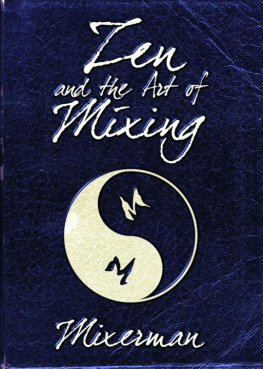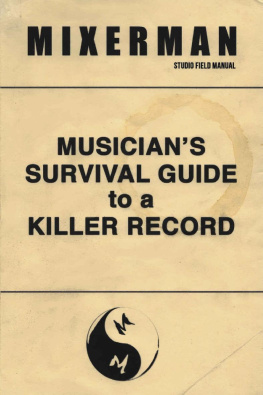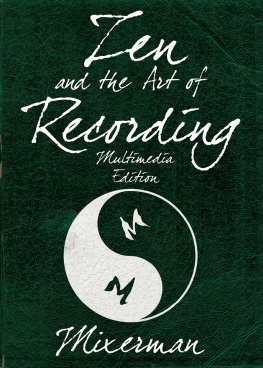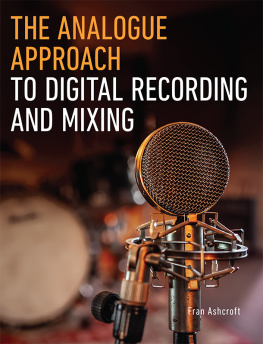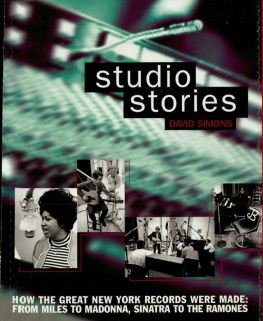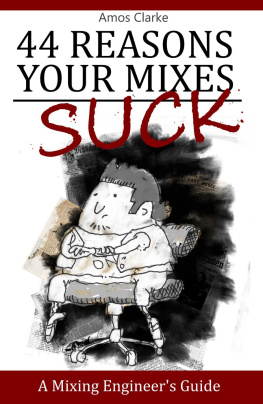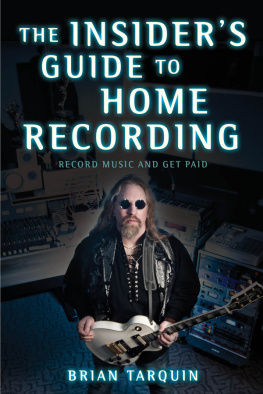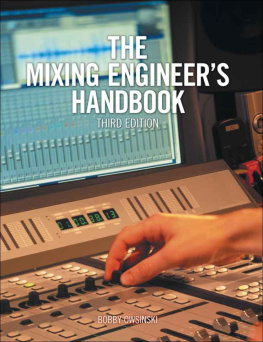





Special thanks to:
Jeff Mutschler
David Wozmak
John Dooher
Hal Leonard
John Cerullo and his entire team
Rusty Cutchin
Carolyn Keating
Jeffery Lesser
David Collins
Bridget Gardiner
Peter Bunetta
Bob Olhsson
Slipperman
Aardvark
The Womb Forums and all of my friends who run the place with me
A posthumous thank-you to Dave Hill of Dimension Sound Studios for everything he taught me
...................... iii
.......................... 1
.............. 9
............ 12
.......... 14
...... 15
...... 17
.......... 20
Chapter one
................... 23
............ 23
........... 52
........... 54
Chapter Two
.................. 57
.............. 57
.............. 60
.......... 62
............ 65
......... 65
........ 68
......... 70
............ 72
.......... 73
.......... 73
............ 74
.. 76
..... 79
.... 85
............ 87
.............. 89
........... 91
Chapter Three
........................ 93
.......... 94
........... 97
.............. 102
.............. 106
........... 111
........... 114
............ 115
.............. 121
........... 122
........... 123
......... 125
............ 127
.......... 128
......... 130
............. 131
....... 132
............. 136
............ 137
............ 143
......... 145
......... 149
........... 150
............. 151
............ 154
........ 156
Chapter Four
............... 157
............. 161
............. 164
.......... 168
............. 170
........ 176
.......... 179
........... 182
............. 186
.......... 188
............. 190
........... 193
Chapter Five
..................... 197
........... 198
........ 202
........... 207
....... 209
............ 214
......... 219
......... 223
.......... 227
.............. 233
............ 234
Chapter six
.............. 235
...... 245
......... 246
......... 248
.............. 250
......... 251
Chapter Seven
................. 253
....... 255
.............. 256
............ 257
........... 259
........... 261
............ 264
.......... 265
.......... 266
............. 266
............. 269
........... 271
.............. 272
.......... 273
...... 276
......... 278
............. 280
Mixing, done properly, and much like anything else worth doing, is an art.
So you want to mix. Let me guess-you've done more than one mix in your life, probably several, maybe a hundred, and every time you make a new mix you're sure you've done a great job, only to realize later that your mix is terrible. That sounds vaguely familiar to me.
The good news is you're not delusional. You're not listening to your god-awful mixes thinking, "Man, I should be getting paid!" That's a good first step.
Great mixers are few and far between. You can just look at the successful mixer's pay scale to understand that the supply of great mixers is considerably less than the demand. Granted, the major labels have taken this view to the point of almost irrational superstition, but there's no doubt that a mix can make or break the success of a production, so on some level you can understand their position. The problem is that the labels have lost sight of what makes a mix great and have ultimately settled for nothing more than homogenized mediocrity, what with sending their productions to veritable mixing and mastering factories. There is no art in a factory. Not even in an art factory.
The importance of music in our lives can't be overstated. We connect with each other through music. Whether we're singing "Auld Lang Syne," "Happy Birthday," a national anthem, a school fight song, or even "We Will Rock You," music brings us together, both young and old. We don't need an orchestra or a band to sing. We don't need an arrangement, and we most certainly don't need a mix. We just need ourselves, and in the spirit of sociability, our friends and acquaintances.
Our memory where music is concerned can be nearly flawless. We can have an entire orchestra in our heads playing the "1812 Overture" in a flash. We can lose ourselves in music without the presence of any outward sound, although admittedly even the most reserved of us will probably be blowing off air cannons. For some reason visual memory pales in comparison to auditory memory. Sure, we can recall a picture that we're familiar with, but the details are lost and are nowhere near as clear as our recall of a familiar song.
Even if you were to disagree with this assessment, at the very least we can agree that a visual memory is far less transferable than an auditory one. I can scribble down some resemblance of a picture, but it probably won't mean very much to anyone else. But a song? A song I can sing, and more importantly, I can get you to sing it with me.
I took a day job one summer between college semesters. For the most part I was a shipping clerk, but at the end of each day it was my job to vacuum the sales office. This was in the late '80s, just a few years after The Breakfast Club came out. There's a memorable scene in that movie where one of the troubled teens begins to aimlessly whistle the "Colonel Bogey March," a universally familiar song. Within moments the entire gang of teens joins in.
There was something about the camaraderie of that scene that I adored. I wanted to experience that for myself. So one day, as I made my way through the office with my vacuum, I started whistling the song, and you know what? The entire office joined in. And they didn't just whistle, they moved as they whistled. They swayed, bounced, and nodded enthusiastically. Every day I'd whistle, and every day, the entire office staff would join in. No one ever talked about it. No one ever acknowledged it other than to participate. Here I was, a 20-year-old student, and I could get an entire office of 30-something salespeople to whistle and move their bodies to a simple song each and every day.

